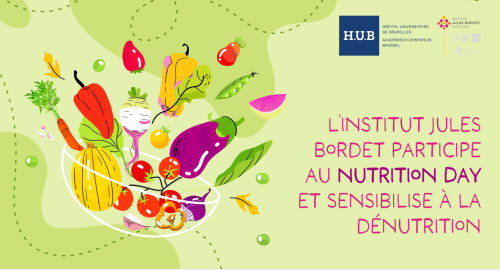Nutrition Day 2022
News 08/11/2022
The risk of malnutrition is particularly high for cancer patients
The three institutions of the Brussels University Hospital (H.U.B) are taking part in Nutrition Day and raising awareness of malnutrition associated with illness in a hospital environment. The Jules Bordet Institute, reference centre in the fight against cancer, is evaluating malnutrition among cancer patients, also thanks to your input through the annual "Nutrition Day" audit carried out among hospital patients on 10 November 2022.

Between 20% and 40% of cancer patients are affected by malnutrition
The malnutrition associated with chronic diseases is a risk factor that is far too often neglected. Some patients already show signs of malnutrition at the time of the cancer diagnosis. Following hospitalisation, between 20% and 40% of cancer patients are affected by malnutrition (the figure varies depending on type of cancer and patient age). Patients with cancers of the head and neck zone, upper digestive tract and haematological cancers are at particular risk. Characterised by weight loss, loss of appetite and reduced muscle mass, malnutrition increases the risk of intolerance to treatment, prolonged hospitalisation and reduced quality of life. In some cases, the side effects of treatment, a depressive and /or anxiety reaction and social isolation can contribute to malnutrition. Early screening for signs of malnutrition requiring a nutritional intervention is therefore essential.
A balanced diet, physical activity and correct weight to combat malnutrition
During the post-treatment period it is important for the patient to eat correctly, continue with an appropriate physical activity and maintain a correct weight (a "healthy" weight). A healthy and balanced diet coupled with the practice of a physical activity enables the muscles to assimilate proteins and thereby maintain the essential muscle mass in case of illness. Physical activity also acts positively on hormone levels and immunity, thereby increasing tolerance to treatment and boosting powers of recovery. Whether as a means of prevention, during treatment or during remission or recovery, it is important to maintain a healthy weight, that is, a BMI of between 20 and 27 kg/m².
Report any suspicions of malnutrition
Malnutrition is of concern to all, whether a patient, close friend or relative of a patient or member of the care staff. You should report any sign of malnutrition, such as loss of appetite, involuntary weight loss or fatigue, to the doctor or dietitian so that the appropriate dietary solutions can be applied. Consisting of six dietitians, two nutrition nurses and a doctor specialised in clinical nutrition, the nutrition team accompanies cancer patients on a day-to-day basis throughout their treatment so as to avoid malnutrition. Malnutrition needs to be detected early so that the appropriate care and support can be provided.
Participate in Nutrition Day 2022 and help improve our knowledge of malnutrition
Nutrition Day, initiated by the European Society of Clinical Nutrition and Metabolism (ESPEN), is an audit carried out by hundreds of hospitals and care homes worldwide with the aim of collecting data on the nutritional condition of patients, comparing these data between institutions and raising awareness among patients and nurses of an often under-estimated problem. Specifically, the patients of six H.U.B. units will be able to benefit from a nutritional audit. The parameters identified will enable hospitals worldwide to improve malnutrition screening and care.